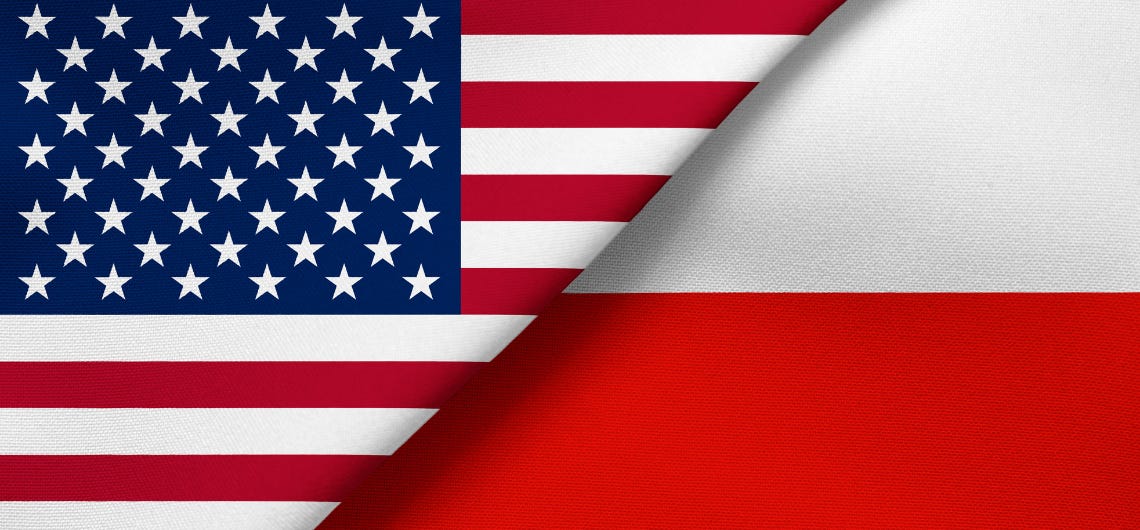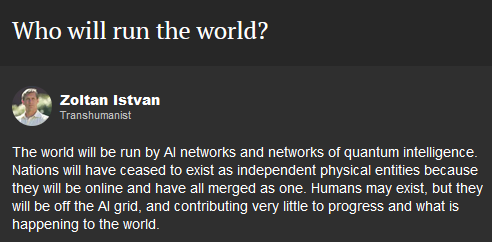Saturday Commentary and Review #88
Americanization of UK Political Culture, Poland Hemmed in on All Sides, ESG as Corporate PR Bullshit, Shoving Nerds Into Lockers, Chad Shkreli and the Journo
As a little kid in early 80s suburbia, I noticed that the teenagers around me were neatly divided between those that listened to American music (generally Hard Rock and Heavy Metal), and those who preferred the New Wave that was being imported from the UK. My older cousins were very much in the latter group, and their tastes influenced my own sensibilities. This was an era where choice in music defined youth culture, from slang to fashion, and so on. Music was the spoke that turned the wheel.
Growing up in that decade in Canada, we were lucky (IMO) to be exposed to British popular culture, as it gave us something to compare to the American one, a popular culture that would swallow Canada whole by the 1990s thanks to the proliferation of cable television. Anglophone Canada fell with barely a fight being put up (CANCON being a notable exception). This is best exemplified in normal patterns of speech. Canadians will answer to questions from the Police by saying “yes, Officer” instead of “yes, Constable”. In court, one will hear “Your Honour” instead of the correct “Your Worship”. These are just minor examples.
I did not expect British culture to become Americanized. I found their comedies funnier, their music better and more interesting, and that they would protect their way of life thanks to the rich history that they have, especially when compared to their cousins across the pond. After all, Britpop music of the mid-90s was incredibly upfront about its Britishness, never rejecting the opportunity to wave the Union Jack when possible.
The third decade of the new century sees a different Britain. American soft power has permeated the UK so much so that its political culture is now increasingly Americanized. The yapping poodle of Atlanticism is transmogrifying to the horror of Brits like Christopher Hatton:
The second is more dispiriting. There is now a significant element of the British elites — not limited to, but certainly including, our politicians — which behaves as the Americanised ruling class of a supine client kingdom. This has been obvious recently in the political realm. As I recently observed, atlanticist Conservatives now argue for a presidential system of government and for a purported separation of Church and State, betraying their party’s historic Toryism. Far too many British politicians have their socio-political imaginary shaped by The West Wing and by self-deluding fantasies of Reaganite liberal atlanticism, abandoning any worldview drawn from British history or the prospect of an organic future recognisably of our own.
I am wont to describe the political leadership of European countries as less Prime Ministers/Presidents than Regional Franchise Managers. I believe that there is merit to this insult.
The role of the UK media:
Our lobotomised journalistic class bears great responsibility for this. Obsessed with the U.S. culture wars, and possessed of an arrogant monolingualism usually associated with boozy Brits on holiday slowly and loudly demanding directions to the beach, the BBC and major newspapers devote their energies to the minutiae of Democratic primaries or breathless and credulous commentary on whichever social shibboleth is currently being inappropriately adjudicated by their Supreme Court.
There is precious little serious reporting on France or Germany, and virtually no sustained coverage of anywhere else. The British journalistic classes convey caricatured portrayals of Europe’s Macrons or Merkels, and endless analyses of bathroom policies in Iowa (or wherever).
One cannot be blamed for watching the slow-train wreck that is US politics today. However valid his point is, trends in US politics will inform those in its far-flung satrapies, like the UK or my own country. The metropole informs the provinces, which is why absurdities like #BLMCanada or #BLM in the UK exist, divorced from the history of these two countries, wholly borrowed from the USA.
A healthy dose of reality:
That the British Empire was dismantled under American moral and economic pressure is not necessarily a bad thing, certainly not for many of Britain’s former subject peoples. Yet it is unhealthy to deceive ourselves that the end result has not been the reduction of Britain to one of the new imperial hegemon’s European client kingdoms.
Britain has never had her necessary Gaullist moment, a taking stock of who we are, where we have come from, and where we want to go in the world. As a result, we are not the high-minded Greeks of Macmillan’s anaesthetic imagination, but more like the cringing provincial elites who petitioned to erect civic temples dedicated to Rome and Augustus.
Speaking of Gaullism, readers of this Substack are well-aware that the French are trying to push back on the Americanization of their own Academia (and therefore politics as well).
There is something decadently late-Hellenistic about the remaining trappings of state in this American client kingdom. Events like State Openings of Parliament and the recent Jubilee, if divorced from a vital and viable British identity, become a fig-leaf of national continuity, covering up our debilitating cultural, political and economic weakness. They serve to hide the ruling class’s atrophying sense of confidence or purpose, as the elite’s old groundings in a wider European culture and a practised Christianity wither away.
A defeatist might be forgiven for looking at the pretentions of Crown and Parliament through the eyes of Constantine Cavafy’s poem “Alexandrian Kings”. The great Greek poet imagines the baroque spectacle of the joint coronations of Cleopatra’s young sons — Caesarion, Alexander and Ptolemy — in the autumn of Hellenistic Egypt, right before its absorption by Rome. The ceremonies are opulent and cosmopolitan, the princelings’ accolades magnificent. Yet the Alexandrian crowds “knew full well what all this was worth, what hollow words were those kingly titles”.
We are not, perhaps, quite there yet. But escaping the sorry fate of the client kingdom requires a refreshed cultural confidence, and jettisoning a ruling class too slavishly devoted to the Caesars across the sea.
Hear, Hear!
We’ll continue with the theme of the USA and its satrapies by turning to Poland. Warsaw is without a doubt the most pro-American large state on the European continent. It has tied itself firmly to DC’s mast, and with good reason: to offset a German-dominated EU and to place itself under the protection of the American umbrella (NATO) vs. Russia.
The Poles sent their forces into Iraq almost 20 years ago to get onto the Americans’ good side, leading Donald Rumsfeld to praise them as the leaders of “New Europe”, contrasting them with “Old Europe”, led by Germany and France, two countries that sat that conflict out. This assistance paid dividends as Poland became a bulwark of NATO defence on its eastern flank. All was well in US-Polish relations while Civic Platform ran the show, with Mr. Anne Applebaum aka Radek Sikorski as main US asset.
Relations took a bad turn when the conservative PiS took power, ejecting the centre-right milquetoast Civic Platform, and proceeded to remove old commie judges from the courts, while rejecting the Merkel-led idea of each EU country hosting and absorbing increasing migrant waves from Africa and Asia, and saying no to social liberalization like gay marriage. PiS’ refusal to Americanize Poland led to attacks from both the EU and the US State Department, with Joe Biden going the furthest, attacking the country as “totalitarian” during his 2020 campaign. Even Trump-appointed Ambassador to Poland Georgette Mosbacher joined in on the fun when she explained that gay rights must trump Catholic culture, saying that “Poland is on the wrong side of history”.
The Polish right, led by PiS, has always had in its hands the trump card of the Russian threat. It has been understood that thanks to Putin and the perceived threat to Europe that he represents, the Poles have much more leeway in running their own country as they see fit, as opposed to much smaller and less strategically significant Hungary. The Russian invasion of Ukraine has forced the Poles to play this card. How is it going? Not very well, according to former Polish Army Chief of Staff Mieczysław Gocuł and long-time Russian watcher John Helmer:
Economically, the war is costing much more in public outlays for the refugees than the value of US and NATO arms flows and related war income. By the time Warsaw pays for its new US weapons, it will owe more than when the war started; and there is still no relief from the European Union funding freeze and penalties.
What’s to be done, the Poles ask themselves – and who’s to blame when they realise the answer is something between not much and nothing.
The principal American in Poland Ambassador Marek (Mark) Brzezinski, has recently called for regime change in Warsaw. He said it this way: “I look at the way we cooperate with the Polish government in a completely different way. We have been consistent in our commitment to security, democracy, values, the economy and people-to-people contacts. One is not subordinate to the other. And we can do several things at the same time. There is no doubt that we unequivocally support Poland in terms of security. There is also no doubt that our approach to the issue of Polish democracy is the same…The priority issues that we see in Poland are equal for us in terms of value. We have worked together as friends in each of these areas: security, democracy, the rule of law, the economy, people-to-people contacts. We are grateful to President Andrzej Duda for some of the actions taken. As President Biden said in Poland, each of us has a job to do. In the Biden administration, we are also working on our democracy and the rule of law. ”
What the Polish audience understands Brzezinski is saying is that “democracy and the rule of law” mean the replacement of the PiS and its leader, Jarosław Kaczynski. By Polish “democracy” Brzezinski doesn’t mean Lewica, the coalition of Poland’s left parties, which are currently drawing 10% in the polls. The US, according to Brzezinski, is as ungrateful to President Duda for most of what he and the PiS are doing as the US is grateful for “some”. As for the Polish economy, it is going to pay $14.1 billion for its new F-35 fighter aircraft, Abrams tanks and Patriot missiles without discounts or domestic production offsets. By “people-to-people” contacts, what the US ambassador means is his special relationship with the sworn rival of the PiS in next year’s campaign, Rafał Trzaskowski; he is the Warsaw city major since 2018 and PO presidential candidate in 2020, when Duda narrowly defeated him.
“Thanks for holding the line, Poland. BTW, we’re gonna change your government too.”
Now watch this:
Balcerac: “Poland is being played on from several sides. On the one hand, the Russian invasion of Ukraine causes an increase in the prices of energy raw materials, and the acceleration of inflation is being exploited by the opposition. On the other hand, the European Union bureaucracy manipulated by Berlin is blocking the disbursement of EU funds to Poland; that too is being exploited by the opposition.”
“In addition, our biggest ally, the United States, is playing a double game, dreaming up plans for regime change in Warsaw. This is evident from the activity of US Ambassador Marek Brzezinski, who spends more time praising the opposition than talking to government representatives. Example: a few days before the provocation by [Civic Platform] MP Klaudia Jachira in the Sejm, Ambassador Brzezinski posed for photos with Jachira in his residence, with his arm around her.”
Helmer’s piece (very, very long) then turns to an English translation of an interview with the General mentioned above:
“I am very concerned that the NATO summit in Madrid is going in the wrong direction. Instead of looking for ways to win peace — because this is the essence of the problem of the eastern flank — the summit is to convince us that we will win the future war if, or rather when, it happens… First of all: NATO at the 2014 summit in Newport, by creating the Readiness Action Plan, increased the Response Force to 40,000 troops, including land, sea, air, space and cyber components. Now, in 2021-22 — because the Russians mobilized their forces for this war in October last year — we have a war. And what happened on NATO’s eastern flank? US troops arrived, but importantly, the NATO Response Force did not arrive. And yet, if Russia’s invasion of Ukraine close to our borders did not cause a reaction by the NATO Response Force, then it is necessary to ask the head of NATO whether the Alliance’s crisis response procedures have been launched at all.”
“If the Pact triggered them, after the initiating phase (conflict detection), it would be necessary to move on to the next phase — strategic assessment by the commander of the combined NATO forces in Europe. Such an assessment should be presented by the commander at a meeting of the North Atlantic Council [NAC – NATO’s most important decision-making body]. After all, this assessment ought to be a simple one. Russia deployed over 150,000 troops and launched an invasion of Ukraine. It was therefore to be expected that the NAC would share the [NATO] commander’s assessment. The next step in NATO’s crisis response should have been to use Response Options Development. But nothing like that happened. We in Poland and the Baltic states understand the threat, but the approach of other NATO states is diametrically different.”
The ex-General is sounding the alarm, saying that NATO is not fulfilling its obligations towards Poland.
Now the tension between Russia and Lithuania is growing, because the sanctions are blocking the Kaliningrad Oblast more and more. Could this be a hotspot?
If Putin wanted to start the war further and decided to cut a corridor through the Baltics to the Kaliningrad District at the Suwałki Gap, what forces could stop him? Could the forces of Lithuania, Latvia, Estonia and Poland stop Putin? Not at all. Putin will not be stopped by the Americans, who are present on the eastern flank only in small numbers. I repeat, Russia talks and calculates only with strong countries and organizations. And NATO in our region is weak.
and
The Estonian prime minister says: ‘Estonia [in the event of an attack by Russia] would be wiped off the map of Europe and its capital razed to the ground’, so NATO’s strategy follows the principle of ‘lose and then liberate’. And this is what it would be like in the event of the Russian invasion of the Baltic states?
This, unfortunately, is true. But let’s start with the basic thing: what is the definition of security? It is the freedom to choose the path of development of the country. After all, what we have today on the eastern flank – in Poland, Lithuania, Latvia, Estonia – is a contradiction of security. There is no free development; there are a lot of restrictions; there is a huge pressure to increase defense spending. And if there is no security, it means that NATO is not meeting the goals set out in the Washington Treaty, so NATO is not a strategic concept today…
The value in the ex-General’s words stem from the fact that he falls firmly within the Atlanticist orbit.
Lee Fang of The Intercept continues to prove himself to be one of the best investigative journalists in the world with this very long piece on how ESG (Environmental, Social, and Governance) in the corporate world is a pile of PR-driven bullshit. I’ve written on ESG before here, so I won’t bother repeating myself, especially considering the fact that I will be turning to it again and again in the future.
Instead, we’ll just share some excerpts from Lee Fang’s piece on how Corporate America uses ESG to polish its image:
CoreCivic, the first publicly traded prison company in America and the first to operate both private prisons and private immigration detention centers on a for-profit basis, had another first to announce. Damon T. Hininger, the chief executive, paused to share the news on a call with investors last month: CoreCivic Inc. was the first company after the George Floyd protests to proactively conduct a “racial equity audit,” the results of which it was now ready to release.
“CoreCivic is one of the very few companies in the United States that has proactively embraced the process,” Hininger gloated.
The private prison corporation’s stock price and access to bond markets had been battered by pressure over its role in profiting from immigrant detention and for providing financial support to Donald Trump’s presidency. The company is currently facing a class-action lawsuit brought by immigration detainees claiming that they were forced to work with little or no pay. The racial equity audit was a conscious effort by CoreCivic not only to mend its poor public image, but also to harness public interest in racial justice to bring the company back into the good graces of Wall Street investors.
This is very funny:
The contents of CoreCivic’s audit pointed to mostly superficial contributions to diversity and equity. The report, conducted by Moore & Van Allen, a North Carolina-based law firm, offered some room for improvement but largely applauded the private prison giant for its “genuine” commitment to diversity principles, including by raising cultural awareness with a mural of Martin Luther King Jr. at one of its Immigration and Customs Enforcement detention centers in Arizona. The report also praised CoreCivic for its philanthropy and business practices that have “benefitted communities of color.”
In an accompanying report on the company’s diversity, equity, and inclusion — known as DEI — CoreCivic touted its ranks of nonwhite prison guards, diversity on its board of directors, and diverse ranks of wardens, as well as its partnership with a Black-led, pro-business trade group.
Those supposed strides elicited eye rolls among its critics. “They put children’s murals on the wall while incarcerating infants. That doesn’t mean they have positive impacts for children,” said Bob Libal, a longtime watchdog of the private prison industry, referencing the company’s Taylor, Texas-based ICE detention center.
ESG (and DEI, by extension), prove my adage that “the genius of America is its ability to co-opt, re-purpose, and monetize any social or cultural trend”. (If there’s one thing that I would like to go viral, it’s this adage. Take note).
The ESG Investment Market:
But Tylek, Libal, and members of the activist community are not the intended audience for the report; the racial equity audit and similar measures are part of an opaque and virtually unregulated rubric that sets the flow of massive piles of investor dollars. CoreCivic’s gestures are meant to shape its standing in “environmental, social, and governance,” or ESG, funds, a catchall term for a system that allows investors to put their money into companies that score as socially responsible by various metrics.
Compliance can be lucrative. For instance, among the many ESG ratings agencies, a company with nonwhite or female board members or a decision to simply conduct a racial equity audit or DEI report can automatically lead to a higher score, and corporations with high ESG rankings find placement in special exchange-traded funds, or ETFs, that are marketed as socially responsible, opening the door for investor cash.
Over $35 trillion in global assets are invested in funds that claim to vet companies using ESG principles, making the label one of the hottest trends in finance. Following the racial justice protests of 2020, a coalition of institutional funds, which now includes the California State Teachers’ Retirement System, a pension fund with over $250 billion in assets, launched proxy campaigns to pressure publicly traded companies to undergo racial equity audits and to prioritize racial diversity issues.
Here’s the argument as to why ESG is a good thing:
Proponents of the approach claim that the market sprouting up around ESG principles provides a window, guiding investors into safer, less controversial companies while creating a market incentive for good corporate behavior, whether on racial justice, the climate crisis, or any number of issues.
Larry Fink, the chief executive of BlackRock Inc. and one of the most powerful ESG-focused asset managers in the world, has described the move toward socially responsible investing as a “tectonic shift” that stands to reshape capitalism as we know it. In his letter to investors this year, Fink made clear that racially diverse boards and racial diversity would be a focus of his company.
ESG is the financialization of “wokeness”. God bless America!
Click here to read the rest of this great piece.
I will slightly amend my earlier statement and say that the theme of this weekend’s Substack is American Soft Power.
One of the greatest crimes of the US Empire these past few decades has been the upending of natural hierarchies. The one I have in mind specifically is the dethroning of the Jocks+Cheerleaders from their rightful place at the top. We can pinpoint the exact moment this trend gained some acceptance in popular culture with the 1984 comedy “Revenge of the Nerds”. The dorks, geeks, and spazzes of Lambda Lambda Lambda Fraternity managed to defeat the Chads of Alpha Beta. This ran counter to Reagan America, but laid the seeds for such horrors as:
the rise of loser culture (90s Grunge and its bastard child, 2010 Tumblr)
computer programmers convinced that they form a “cognitive elite”
IQ worship by online communities such as #HBD
Lockers exist in high school for a reason: to push nerds inside of them. America will not correct its path until this natural hierarchy is restored.
On that note, let’s take a look at some predictions from this Hungarian representative of the “cognitive elite” about how life will be like in 50 years:
…..and last but not least:
The Robot is immune to the human concept of romance and love. It simply does not compute.
I am working on trying to land Martin Shkreli for an interview for this Substack. He would be a massive “get” for me, and I have hundreds of questions lined up for him, should he be able to sit with me. His parole conditions might force us to wait for a bit, but the wait would definitely be worth it.
With that in mind, we’ll end this weekend’s Substack off with this piece from late 2020 that describes how Chad Shkreli managed to seduce a journalist sent to cover him.
Almost every weekday for six years, Christie Smythe took the F train from Park Slope downtown to her desk at Brooklyn’s federal court, in a pressroom hidden on the far side of a snack bar. Smythe, who covered white-collar crime for Bloomberg News, wore mostly black and gray, and usually skipped makeup. She and her husband, who worked in finance, spent their free time cooking, walking Smythe’s rescue dog, and going on literary pub crawls. “We had the perfect little Brooklyn life,” Smythe says.
Then she chucked it all.
Over the course of nine months, beginning in July 2018, Smythe quit her job, moved out of the apartment, and divorced her husband. What could cause the sensible Smythe to turn her life upside down? She fell in love with a defendant whose case she covered. In fact, she broke the news of his arrest. It was a scoop that ignited the internet, because her love interest, now life partner, is not just any defendant, but Martin Shkreli, the so-called “Pharma Bro” and online provocateur, who increased the price of a lifesaving drug by 5,000 percent overnight and made headlines for buying a one-off Wu-Tang Clan album for a reported $2 million. Shkreli, who was convicted of fraud in 2017, is now serving seven years in prison.
Click here to read the rest.
Thank you once again for checking out my Substack. Hit the like button and use the share button to share this across social media. Leave a comment below if the mood strikes you. And don’t forget to subscribe if you haven’t already done so.















Regional Franchise Managers.
Mic
Drop
Fucking A
I often think of George Friedman's 90s era predictions that, by roughly our current decade, the four major powers of the world would be the USA, Japan, Turkey, and Poland. He also predicted that both Russia and China would collapse and split up by now, thus neutering them as international actors of any significance.
Pretty easy, in retrospect, to laugh at these predictions because of how far off the mark they are in hindsight. At the same time, I don't really think Friedman is a *complete* moron--in particular, the notion that Poland had the potential to become a major military and economic force in the world isn't implausible. Maybe in an alternate timeline in which NATO had fallen apart and the EU had stayed in a smaller corner, a Visegrad alliance led by the Poles could have fulfilled Friedman's prediction. Perhaps they'll come to regret missing their chance to go for gold in order to become an American client state; assuming they don't regret it already.